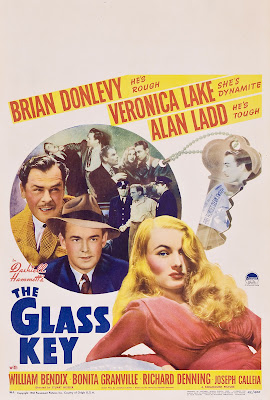
Director:
Stuart Heisler
Year: 1942
Rating: 8.0
Year: 1942
Rating: 8.0
The
novel The Glass Key had been made into a film in 1935 starring George Raft,
Claire Dodd and Edward Arnold but after The Maltese Falcon in 1941, Dashiell
Hammett was in hard currency again. Hammett had been hit smack with a massive
case of writer's block and had not written a word in almost eight years since
The Thin Man was published in 1934 (and never would write again). And
that took him three years to write and it is stuffed with feather bedding.
The Glass Key came out in 1931 and is one of the great noir books with its
lean spare writing style and tough terse dialogue. If Hemmingway had written
noir instead of always trying to write the Great American Novel, he would
have sounded a lot like Hammett. In his lifetime, Hammett only wrote five
novels and a bunch of short stories that had been published in Black Mask
but he is the foundation of all the tough guy crime novels that came afterwards.
Hollywood is said to have destroyed Hammett - he went to work for the studios
as a script writer and made so much money and hated his job so much that
he went into a crazy downward spiral of drinking, partying and prostitutes
and just lost the drive, the creativity and never got it back. He was 40
when the Thin Man was published.
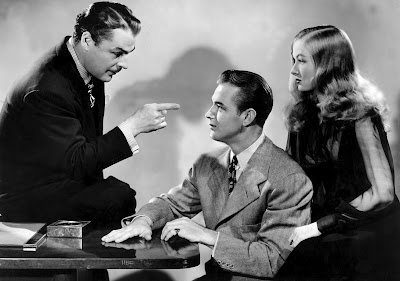
Paramount which had produced the first Glass Key still had the rights and so decided to do a re-make only seven years later. It turned out that they had a hot property on their hands - two of them in fact. The previous year they had paired Alan Ladd and Veronica Lake in the Graham Greene novel This Gun for Hire in which Ladd plays a socially maladjusted assassin who gets suckered and Lake is his hostage who treats him sympathetically like a lost beaten dog. It was a big hit. For Ladd who had been playing small roles often uncredited since 1932 it was a life saver and he never looked back being a star till the end. Lake didn't have to wait as long and became an overnight star in 1941 with Sturges's Sullivan's Travels, as perfect a Depression comedy as you can get. Even that early though she began getting a reputation as being very difficult on the set and her co-star Joel McCrea swore he would never work with her again (though he did six years later in Ramrod). Ladd never made the same promise and the two of them were to co-star in three classic noir films - also the Blue Dahlia in 1946. They made one other film together - Saigon - but no one ever mentions that one. Ladd had been potential leading man material - though blonder than most - but he was very short and finding leading ladies was tough till Lake came along - incredibly petite, small boned and most importantly shorter than Ladd. With his future leading ladies they found ways to make him look taller than them - even digging ditches for the women to walk in while next to him.
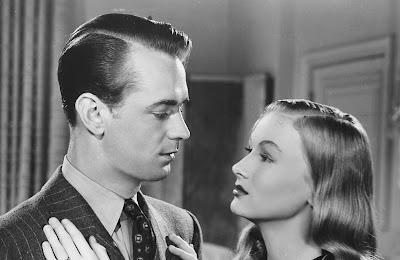
The two of them have astonishing sexual chemistry between them in this film though there is only one kiss at the very end. Every time they connect it is like electricity and the looks, glances between them is basically foreplay. Much of the book is transferred right into the film script by Jonathan Latimer, who was a fairly successful crime novelist in his own right. In the book all the characters are impenetrable - Hammett never takes us into their thoughts, their motivations - we just witness what they do and say and have to draw our own conclusions. This is how the film plays out as well. Though Ladd is third in the credit rankings behind Brian Donlevy and Lake, this is his film. He takes the steering wheel and drives it right through. But he gets some great support. Lake gives a fascinating performance - femme fatale or not - stunning in that Veronica Lake manner - coy and sleek with her eyes and Cheshire Cat smiles doing most of the acting. Donlevy is tough and gruff who prefers talking with his fists. Stealing the show though whenever he is in a scene is William Bendix who describes himself in the film as "Just a big good-natured slob". This mind you is right after he has strangled someone to death. In his vicious sadistic beating of Ladd earlier on he apparently really hit him and knocked him out. The two of them became friends for life afterwards.
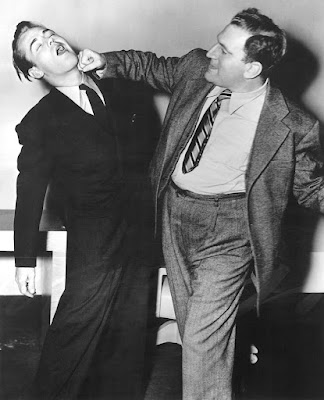
This comes in at a taut 80 minutes - with not a wasted scene or word. It takes place in a small corrupt city - like they all used to be - run by politicians in hook with the mob. This town is run by Madvig (Donlevy) and his right-hand man is Beaumont (Ladd). Madvig does the enforcing and Ladd does the thinking. When they get out of alignment over a girl things begin to fall apart. Madvig decides to support the Reform Party because the man running has Janet (Lake) as his daughter. It was love at first slap. Beaumont tries to convince him that she is playing him for a sucker but he won't listen. Ain't love grand. The first time Beaumont and Janet meet they size each other up - he knows exactly what she is up to but it is clear they want each other for desert. The brother of Janet is killed, she thinks Madvig did it as does Madvig's sister (Bonita Granville - Nancy Drew) and a racketeer on the outs with Madvig decides to use it to destroy him. His man Jeff (Bendix) does what he is told to. The more pain he can inflict the better.
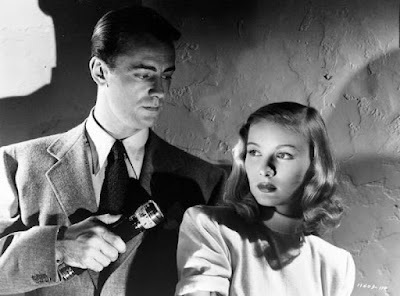
It is just a terrific film - gritty, hard hitting and well shot by director Stuart Heisler. Heisler seems a strange choice - nothing much before or after that is well-known but he struck lightning with this one. It is a movie of perverse romances really - the bond between Madvig and Beaumont is hard to explain - but Beaumont's loyalty to him is the only pure emotion in the film. Then there is what is almost an S&M bond between Jeff and Beaumont - or as Jeff calls him "my little rubber ball". And then between Beaumont and Janet - two cynical calculating slightly immoral people. A fascinating hopeless love story.
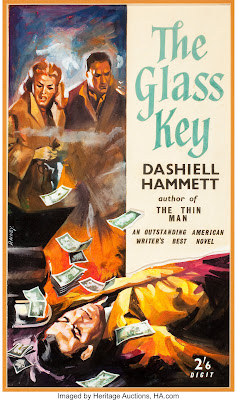

Paramount which had produced the first Glass Key still had the rights and so decided to do a re-make only seven years later. It turned out that they had a hot property on their hands - two of them in fact. The previous year they had paired Alan Ladd and Veronica Lake in the Graham Greene novel This Gun for Hire in which Ladd plays a socially maladjusted assassin who gets suckered and Lake is his hostage who treats him sympathetically like a lost beaten dog. It was a big hit. For Ladd who had been playing small roles often uncredited since 1932 it was a life saver and he never looked back being a star till the end. Lake didn't have to wait as long and became an overnight star in 1941 with Sturges's Sullivan's Travels, as perfect a Depression comedy as you can get. Even that early though she began getting a reputation as being very difficult on the set and her co-star Joel McCrea swore he would never work with her again (though he did six years later in Ramrod). Ladd never made the same promise and the two of them were to co-star in three classic noir films - also the Blue Dahlia in 1946. They made one other film together - Saigon - but no one ever mentions that one. Ladd had been potential leading man material - though blonder than most - but he was very short and finding leading ladies was tough till Lake came along - incredibly petite, small boned and most importantly shorter than Ladd. With his future leading ladies they found ways to make him look taller than them - even digging ditches for the women to walk in while next to him.

The two of them have astonishing sexual chemistry between them in this film though there is only one kiss at the very end. Every time they connect it is like electricity and the looks, glances between them is basically foreplay. Much of the book is transferred right into the film script by Jonathan Latimer, who was a fairly successful crime novelist in his own right. In the book all the characters are impenetrable - Hammett never takes us into their thoughts, their motivations - we just witness what they do and say and have to draw our own conclusions. This is how the film plays out as well. Though Ladd is third in the credit rankings behind Brian Donlevy and Lake, this is his film. He takes the steering wheel and drives it right through. But he gets some great support. Lake gives a fascinating performance - femme fatale or not - stunning in that Veronica Lake manner - coy and sleek with her eyes and Cheshire Cat smiles doing most of the acting. Donlevy is tough and gruff who prefers talking with his fists. Stealing the show though whenever he is in a scene is William Bendix who describes himself in the film as "Just a big good-natured slob". This mind you is right after he has strangled someone to death. In his vicious sadistic beating of Ladd earlier on he apparently really hit him and knocked him out. The two of them became friends for life afterwards.

This comes in at a taut 80 minutes - with not a wasted scene or word. It takes place in a small corrupt city - like they all used to be - run by politicians in hook with the mob. This town is run by Madvig (Donlevy) and his right-hand man is Beaumont (Ladd). Madvig does the enforcing and Ladd does the thinking. When they get out of alignment over a girl things begin to fall apart. Madvig decides to support the Reform Party because the man running has Janet (Lake) as his daughter. It was love at first slap. Beaumont tries to convince him that she is playing him for a sucker but he won't listen. Ain't love grand. The first time Beaumont and Janet meet they size each other up - he knows exactly what she is up to but it is clear they want each other for desert. The brother of Janet is killed, she thinks Madvig did it as does Madvig's sister (Bonita Granville - Nancy Drew) and a racketeer on the outs with Madvig decides to use it to destroy him. His man Jeff (Bendix) does what he is told to. The more pain he can inflict the better.

It is just a terrific film - gritty, hard hitting and well shot by director Stuart Heisler. Heisler seems a strange choice - nothing much before or after that is well-known but he struck lightning with this one. It is a movie of perverse romances really - the bond between Madvig and Beaumont is hard to explain - but Beaumont's loyalty to him is the only pure emotion in the film. Then there is what is almost an S&M bond between Jeff and Beaumont - or as Jeff calls him "my little rubber ball". And then between Beaumont and Janet - two cynical calculating slightly immoral people. A fascinating hopeless love story.
